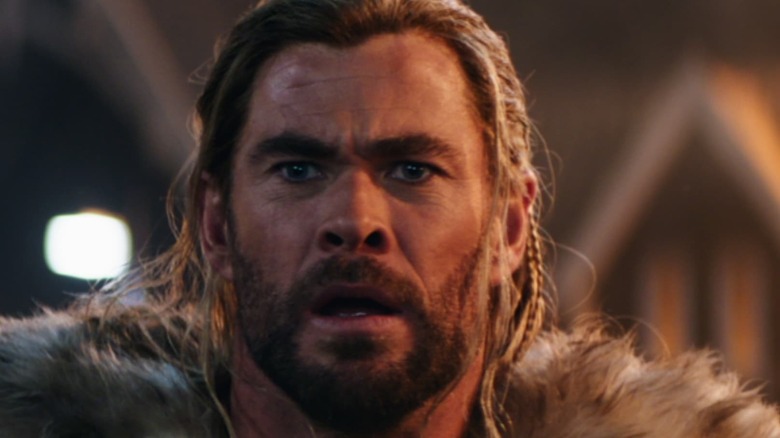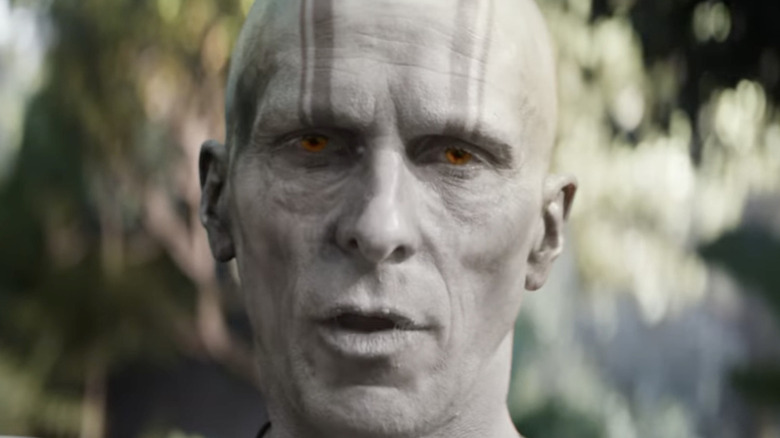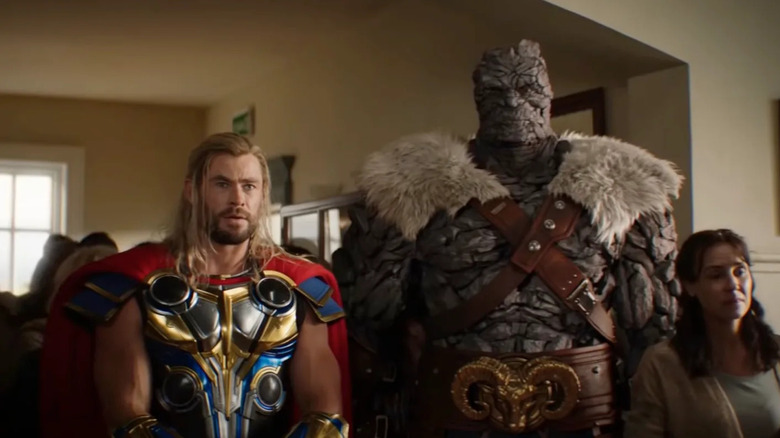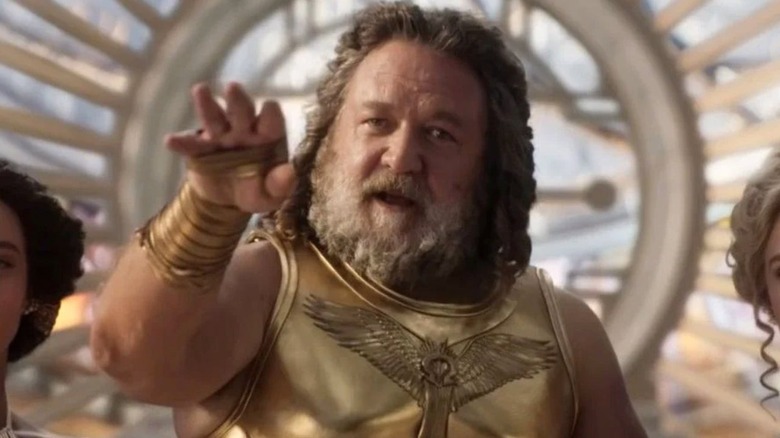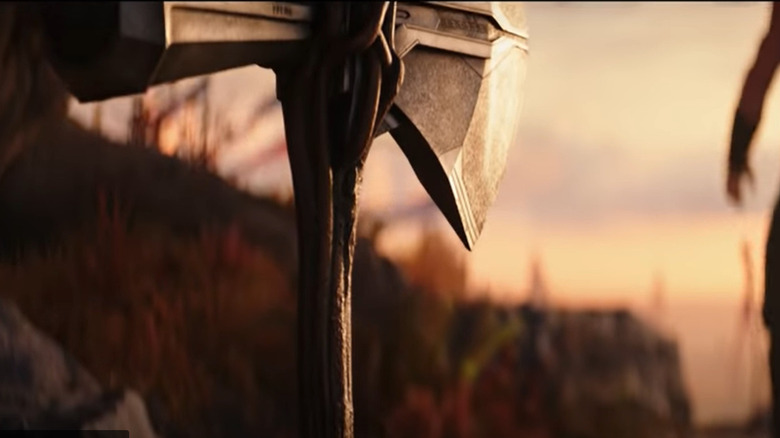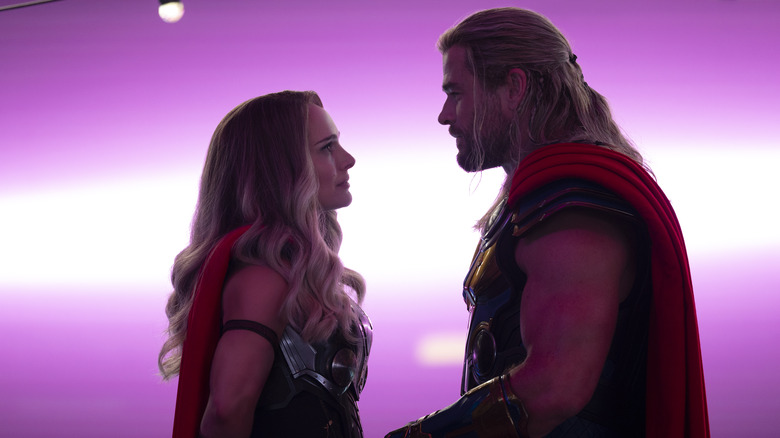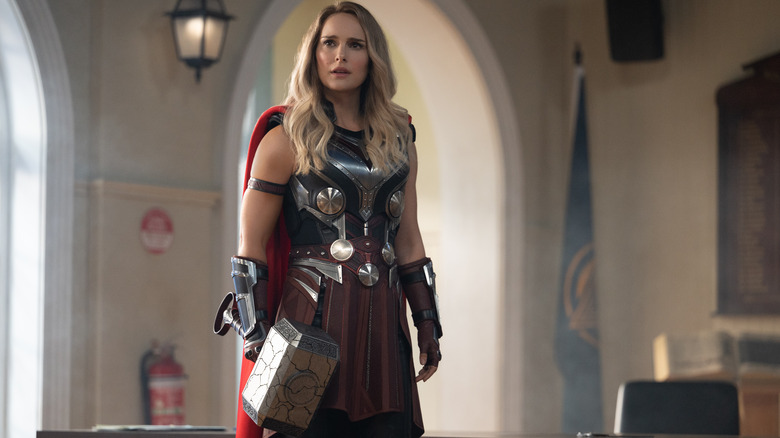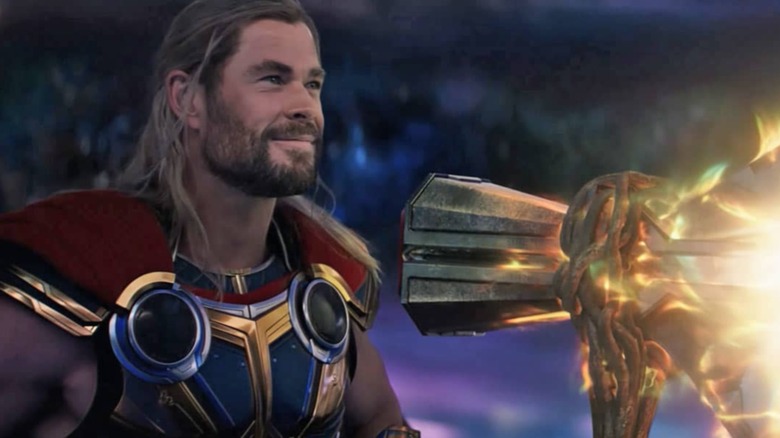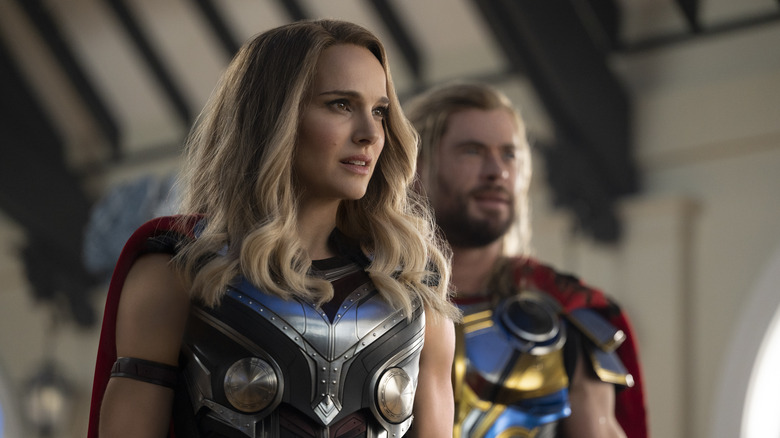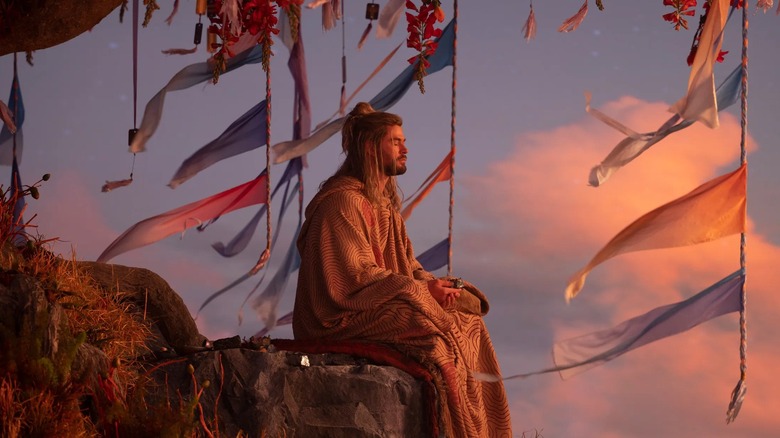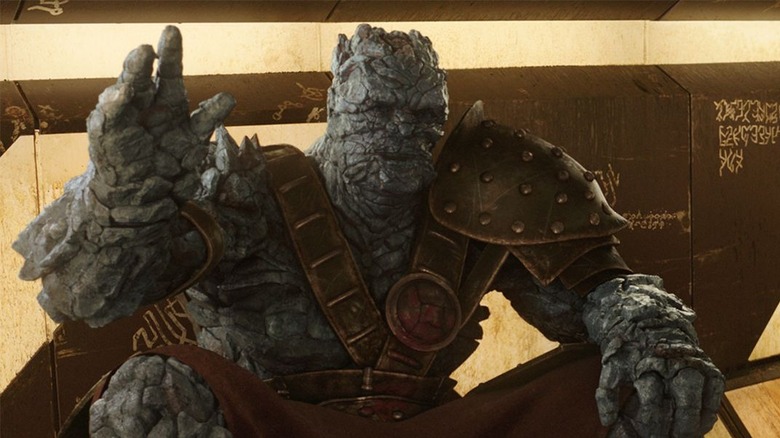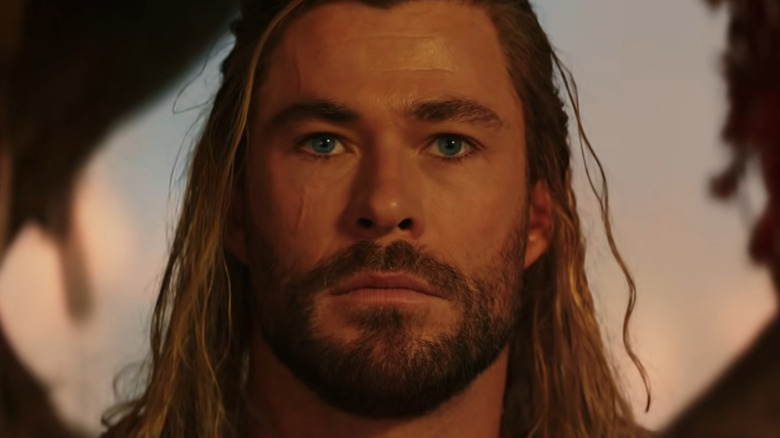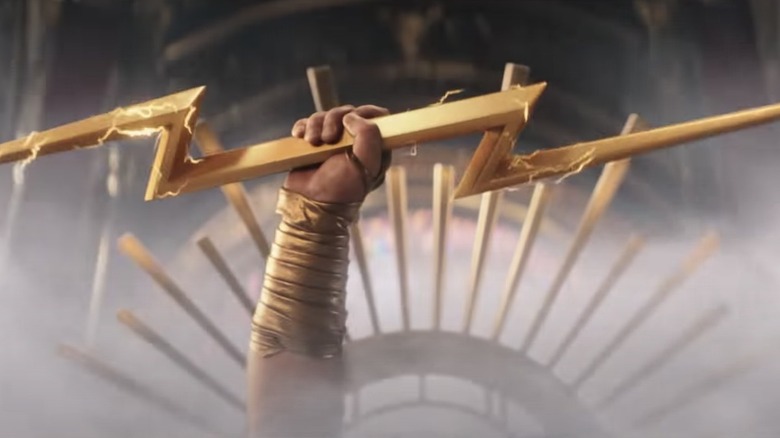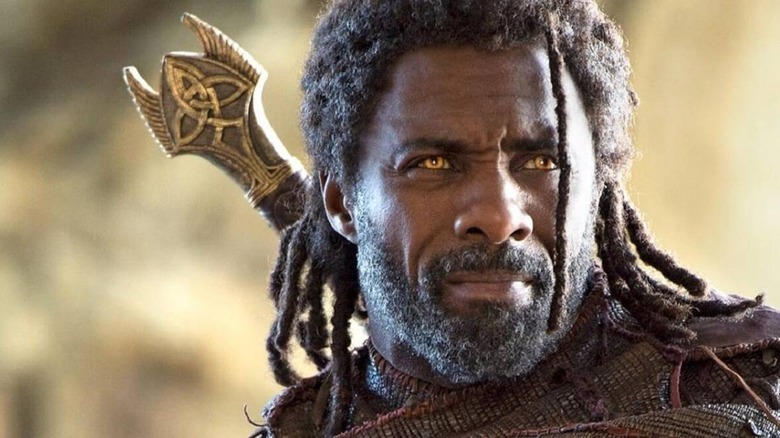The Ending Of Thor: Love And Thunder Explained
"Thor: Love and Thunder," the 29th movie in the Marvel Cinematic Universe, is out of this world — as in literally, a lot of it takes place in space. Compared to films like "Spider-Man: No Way Home" and "Doctor Strange in the Multiverse of Madness," though, and shows like "What If?" or "Loki" that mess around with variants and alternate timelines and dimensions, it's pretty down to Earth. The film doesn't really deal with the multiverse or the blip, and its plotline is straightforward enough for even the youngest viewers to understand: Thor wants to get back together with Jane Foster, but he needs to stop Gorr the God Butcher from carrying out his vendetta.
Taika Waititi's second go-round with the Norse God of Thunder is in part a romantic comedy and in part a mythological-slash-religious parable. It's more concise and self-contained than many other recent MCU entries. That means it works well as a standalone movie, especially for those who may not have kept up with all of Marvel studio's ever-expanding output since it wraps up most of its business in a sassy little bow by the end. But it still moves fast and sometimes relies on subtext instead of text to explain what's really going on, and it'll nevertheless impact the rest of Phase 4 and future projects moving forward (and that's particularly true for those post-credits scenes). This is how "Thor: Love and Thunder" resolved, where it left things, and what it could all mean. Spoilers ahead.
Gorr gets a weapon and turns against the gods
To make sense of the ending, we have to go back to the beginning and revisit the inciting incident that sets both Thor and Gorr on their oppositional paths to self-discovery. In the emotionally crushing opening scene of "Thor: Love and Thunder," Gorr's daughter dies of starvation in his arms as he prays to his god, Rapu. After he buries her, Rapu appears to him in an oasis, but rather than reward him for his piety, he mocks him for believing in an eternal reward. This devastating, humiliating encounter drives Gorr to renounce his religion just as the Necrosword calls to him. With his family and faith gone, he has nothing left to lose.
Rapu — doubting Gorr is a threat — tells him that the Necrosword is a cursed weapon with the power to kill gods. In the comics, it's also called All-Black, and it was forged by God of the Void, Knull, to slay Celestials. The Necrosword is a symbiote that draws power from the vengefulness of its user until it eventually corrupts and kills them. That's why Gorr's appearance changes. A black blood-like substance increasingly seeps from his eyes and mouth, and his skin becomes paler and more marked. As soon as he picks it up, these deteriorations start to take effect. He initially feels as though he's been given power, which he has; it just comes at a high price. Gorr wields the Necrosword to butcher his own god, then vows to take down all the rest.
The weapon doesn't make it through the movie, but — as the concept of symbiotes has recently been introduced into the MCU — its backstory and presence here are still noteworthy.
He uses the kids as bait
As Thor comes out of his funk to defend planets and people who suddenly find themselves without gods to protect them, he starts to realize that all the intergalactic unrest is related. Through distress signals, he sees that gods are being murdered across the universe, and a gravely injured Sif warns him that he could be next. Sure enough, Gorr and his Black Berserkers (shadow beasts he conjures with the Necrosword) ambush New Asgard in the middle of the night. Thor, Korg, King Valkyrie, and Jane as Mighty Thor all show up and fight back, but the fight itself is a distraction. Gorr and his minions have rounded up all of New Asgard's children and trapped them in a cage made of his dark magic. The Asgardians think they've won when the Berserkers retreat; only when the locals alert the superheroes that the kids are gone do they grasp what really happened.
Gorr stows the children in the Shadow Realm. Among them is Heimdall's son, who's changed his name from Astrid to Axl, after Guns 'N Roses frontman Axl Rose. Thor tries to help Axl hone his ability to see throughout space and time, as his father could, in an effort to locate them. He uses his own shared vision to speak to the kids and reassure them that the adults are coming to rescue them. What Thor can't see at this point is that Gorr is using them as bait. His plan isn't necessarily to harm the children; it's to lure Thor to him. And the God of Thunder — whose strength is rarely matched but who is sometimes outsmarted — is falling for it.
Zeus guesses Gorr's plan
Once Thor thinks he knows where Gorr's hiding the children, he and his team plot to sneak into Omnipotence City and ask Zeus for an army in order to defeat the villain who's sworn to kill them all. As the festivities begin, our heroes sense that the gods might not be so receptive. Thor attempts to persuade Zeus, but the debaucherous and disinterested Greek god isn't having it. Publicly he mocks Thor, but privately he whispers that he doesn't want to cause a panic, and besides, they'll be fine as long as they stay in Omnipotence City. It's no skin off Zeus's back if Gorr manages to pick off some mortals and a few lesser deities. He basically tells Thor to give up his fight because this God Butcher will never reach Eternity.
Zeus might have underestimated Gorr, but he's exactly right about his plan. Gorr doesn't have to slaughter immortals one by one. If he can make it to Eternity — the cosmic being guarded by godly magic who is essentially the sentient creation force of the universe — the powerful entity will grant him one wish. He could use that wish to wipe out the gods in one breath. Zeus isn't concerned because Gorr would need a key to open Eternity's gate. But just to be safe, he intends to keep Thor and his team prisoner, since they know the location of the gods' refuge. Thor appears to kill Zeus with his own bolt after Korg takes a near-fatal, body-destroying hit, and they barely escape with the powerful weapon in tow.
Stormbreaker is the key to Eternity
While the Asgardians think Zeus's lightning bolt, in lieu of his army, will help them stop Gorr, the God Butcher is after a different weapon. Gorr wants to get to Thor (or wants Thor to come to him) so badly because his battle axe, Stormbreaker, is of infinitely more value to him than the God of Thunder is himself. If he can, he'll kill him in combat, though if everything goes according to plan that won't matter. What he really needs is to get to Eternity. That's where Stormbreaker comes in.
In "Avengers: Infinity War," Thor's second weapon was forged of Uru by the dwarf Eitri, and it's enchanted with the power to summon the Bifrost. Gorr seems to have determined sometime in between killing Rapu and invading New Asgard that the axe is the key he needs to open Eternity's gate. Though the situation is deadly serious when Gorr manages to wrangle Stormbreaker away from Thor just as he, Jane, Valkyrie, and Korg's face portal back to Earth, there's also a running joke about the axe's jealousy whenever Mjolnir's around. Unlike the war hammer, which will only go to those who are worthy, anybody can pick up and use Stormbreaker, including Gorr. When the Bifrost's beam fills the rune-like carvings on the circular door that leads to Eternity, Gorr will be able to enter and ask for whatever he wants from the all-powerful entity.
Thor discovers Jane has cancer
It's convenient that Jane seems to manifest in New Asgard just as Thor realized she might've been the one who got away. He's as elated to see her as he is confused, however, as she's become a Thor in her own right, with Mjolnir, his old hammer that he'd presumed to be broken by Hela and thus useless. The romantic tension between Jane and Thor is obvious, and their hero work becomes an opportunity to resume flirtation.
It's much less convenient that Jane has cancer. The audience knows long before Thor, as does Valkyrie, based on context clues from her conversations with both parties. It seems she wants to enjoy her time as Mighty Thor and her time with Thor Odinson as much as possible, without bringing the sad news of her diagnosis into the mix. But as the former couple gets cozy again in the goat boat watching space dolphins on their way to the Shadow Realm, Jane finally blurts out the truth. Valkyrie interrupts their first kiss in, well, at least eight years, seven months, and six days. But there isn't time to worry about what the future holds; those kids need to be rescued and Gorr needs to be stopped.
Jane and Thor hold onto hope that she might be able to live cancer-free as Mighty Thor. However, during the three-against-one melee, Gorr sees that she's dying. Even with her restorative Viking strength, she looks rough as she takes damage during the battle in which Gorr ends up with possession of Stormbreaker, and both she and Thor begin to face the reality of a more tragic outcome.
Mjolnir is protecting and killing Jane
We learn more about how Jane became Mighty Thor and how Mjolnir is affecting her health (or lack thereof) as the film progresses. Darcy suggests, since modern medicine is failing her, that it might be time to turn to Asgardian magic for a cure. Dr. Erik Selvig confirms through video chat that, indeed, her cancer isn't responding to treatment. That's when Jane feels compelled to journey to New Asgard and attempt to call the shattered hammer into her grip. It works, and the next time we see Jane, she's been transformed into Mighty Thor.
In a montage that retraces the arc of their relationship, we see that Thor once charged Mjolnir with protecting Jane, the love of his life. The hammer took this as an oath. But this magical binding pact isn't perfect by any means, and it isn't a solution to keeping her alive. After the fight in the Shadow Realm, in her human form again, she lands in a hospital bed. It doesn't look like she has much time left. It's implied that the hammer is somehow using up her remaining lifeforce, much the same way the Necrosword both gives and takes power from Gorr. Jane's cancer is a storyline in Marvel comics, too, and those pages go into more detail about how Mjolnir interacts with Jane's disease, though the film doesn't clarify whether it all works the same way. The enchanted relic expels any toxic substances from her body, but that also includes her chemotherapy treatments. However, as they weren't working in the first place, we can't really blame Mjolnir for failing to live up to his oath.
Thor shares his power with the children
Thor leaves an ailing Jane to retrieve the kidnapped Asgardian children and to try and keep Gorr from getting on the other side of Eternity's gate. In an earlier scene with the Guardians of the Galaxy, Thor all but singlehandedly saved the day, much to the annoyance of his supposed teammates. Nonetheless, he espoused the virtue of teamwork to a crowd of people who'd basically just watched. But Thor gets a little wiser with every challenge. To stave off the Black Berserkers and get to Stormbreaker before the Bifrost opens the passageway to Eternity, he'll need actual help.
Thor saves the kids, as promised, proving to them that Gorr was wrong. Some gods are looking out for the little guy. But he goes one step further and — temporarily — grants them all his abilities. Even though they aren't all, strictly speaking, Asgardians, he rouses them to fight as Vikings for as long as the situation should require. What follows is 100% Taika Waititi and makes for one of the most off-the-wall battles in any Marvel movie. The supercharged children, their eyes glowing electric blue, scuffle fearlessly with terrifying monsters twice or more times their size. A girl in a ballerina princess costume and a kid who weaponizes a stuffed bunny seem to be having a great time.
Though this specific application of Thor's powers hasn't been seen before, it checks out that someone who has all-vision and energy manipulation could transfer them in this way.
Jane joins Thor for one last classic adventure
Let's jump back to Jane's hospital room for a second. Thor has no choice but to go after Stormbreaker since he's figured out that Gorr will use it to reach Eternity. Jane wants to come along. He'd rather her remain in the hospital and recuperate so they could have a chance to be together again. But Jane asserts that an even slightly prolonged life confined to a sick bed is no life at all. With his voice trembling, Thor tells her that he loves her, but he does not insist or even ask her to stay behind. As he departs, she weighs her options.
As if she senses that he needs her now as a warring partner and not later as a girlfriend, Jane teleports into the midst of the battle just in time to prevent Gorr from murdering the man (well, god) she loves. He's grateful yet somewhat deflated to see her materialize. He knows it means they have a chance to defeat their enemy, but it'll also likely mean she won't survive the day. Mighty Thor uses hers and Mjolnir's last ounce of strength to obliterate the Necrosword. This immediately ceases its ability to conjure more dark beasts, and it will also hasten Gorr's death. But they haven't prevented the God Butcher from reaching Eternity. Jane and Thor, knowing they may have won the battle but lost the war, share a sad but contented goodbye in which Jane assures him she's confident she made the right choice. She feels as though she's lived a whole second life as a Thor, which isn't bad for human.
Thor teaches Gorr about love and selflessness
For all that meditating under a tree, it's Star-Lord (of all people) who has the emotional maturity to tell Thor what he really needs to hear in order to achieve inner peace. Peter Quill still mourns Gamora, but he assures the Asgardian of the Galaxy that it's better to feel — even if those feelings are painful — than not. His advice opens Thor's heart to the possibility that he and Jane could find love again. He confesses his love before he loses her to cancer. It's also an act of love that Thor respects Jane's choice to have joined him in battle, even though it cost her life.
The purity of their souls in Jane's (and what could be Thor's) dying moments moves Gorr. He'd been dead set on exterminating the gods with his victory, but — staring into the galactic silhouette of Eternity — he has his own change of heart. Thor concedes that he's won, but reminds him that, with his request of Eternity, he could bring back his beloved daughter instead of bringing destruction upon those he has a grudge against. In other words, he could choose love over hate. But, as obvious a choice as this might seem to most of us, it comes with a catch-22. The Necrosword has been feeding and feeding off of Gorr's anger. With it destroyed, he knows he's about to die, too, and regardless of his choice, he won't be around for the repercussions. Sensing good in him, Jane offers that the girl won't be alone. Unlike his own god and despite his reprehensible actions throughout the movie, Gorr ultimately does the selfless thing and gives his daughter another chance.
Korg settles down
Thor met Korg in the gladiator pit on Sakaar and the duo became fast friends. The easy-going Kronan turned out to be an ideal traveling companion and emotional support for the God of Thunder, since he's accepting, positive-minded, honest, and not easily flustered. In other words, Korg is a walking, talking example of healthy masculinity (and a walking, talking pile of rocks whose face is the only part of him that's really alive). He helps Thor process his feelings about Jane, and he's even spot-on in unpacking Valkyrie's survivor's guilt, professional ennui, and hesitation to get back out there again... even if he is a little too direct.
However, through his karaoke-style ballad about the Kronan mating process, Korg makes it painfully clear that he longs for a romantic partner and some little Kronans, too. The courting and mating process might look different from those of humans and Asgardians (it involves some seriously committed hand-holding and molten lava), but the feelings and intentions are the same. That's why, in a final montage that lets us know how everybody's getting on, it's so gratifying to see Korg has met somebody. He and a nice Kronan guy with a mustache stare lovingly at each other as they're ready to start their family. Taika Waititi explained to Rolling Stone that in the comics, all Kronans are male and their offspring are produced exactly as Korg describes.
Love and Thunder become a family
It's Thor's newly opened heart — courtesy of Star-Lord and Jane's influence — that allows Thor to take on the responsibility of parenting his former adversary's child. As Gorr and his daughter say their goodbyes, he asks Thor to promise to watch out for her in his absence. For a moment, we don't know what his protection will look like. But when the next scene cuts to Thor's kitchen, where he's making a little girl "panflaps," we can see that Thor has adopted her as his own daughter, and we learn from Korg's narration that he calls her Love. This obviously gives the subtitle of the film a whole new meaning, and one that nobody could've predicted or interpreted without this piece of plot resolution.
He's still struggling with the learning curve of being a parent. She's a picky eater, and strong-willed when it comes to her fashion choices. She's also colored all over Mjolnir, who has been refurbished and is his primary weapon again. But all things considered, he's doing well as a dad, and he looks more confident instructing her in the ways of Asgardian warriors. Stormbreaker, who played a significant part in her resurrection, is her weapon now. It seems that Thor has transferred his abilities to Love, with the way he temporarily shared his powers with the captive children serving as a precursor. "Thor: Love and Thunder" ends with a title card that reads "Thor will return," though it doesn't say when or where. We don't know if Love will join him, but if she does, the fact that she's played by Hemsworth's own daughter, India Rose, will help with scheduling and contracts.
A vengeful Zeus calls upon Hercules
Zeus thought he had everything under control. At first, Thor was sheepish even taking the stage. Zeus teased him, stripped him of his robes, and threatened to jail him, all the while clearly believing he had the upper hand. He certainly didn't expect to be impaled with his own lightning bolt and fall lifeless from his hovering dais. For someone with as much hubris as Russell Crowe's hilariously pompous Zeus, the harm to his pride must've hurt worst than the hole in his chest.
It's genuinely surprising to see Zeus alive in the mid-credits stinger. The characters talk about him as if he's dead for the rest of the film proper. Thor even expects there to be fallout since he murdered Omnipotence City's highest-ranking god in front of all the other gods. But there he is, the God of Lightning complaining to someone just off-screen about his new nemesis, the God of Thunder. That someone turns out to be Hercules, played by "Ted Lasso" star Brett Goldstein. He's outfitted in, well, not much really... some chest straps, a gold crown, and a sword. And he looks pretty jazzed about the chance to go after Thor for his daddy.
There've been no official announcements about any upcoming MCU projects in which Goldstein will star, but as the MCU has been heading in a decidedly mythological direction as of late between "Eternals" and "Moon Knight," the character's introduction at this juncture makes sense. A Hercules based on the one from Greek and Roman mythology has been appearing in Marvel comics since 1965's Journey into Mystery Annual #1 in which Herc fights Thor.
Jane is welcomed into Valhalla
If the mid-credits stinger sets up new conflicts, the end-credits stinger puts some to rest. Heimdall, the Asgardian warrior and protector of the Bifrost, was slain by Thanos early on in "Avengers: Infinity War." Since he fought bravely as a Viking and perished in battle, we could safely assume he transcended to the paradise of Valhalla. Audiences recently got a peek at another version of the afterlife in "Moon Knight," when Oscar Isaac's Marc Spector and Stephen Grant died for a while. Their brief visit came with the explanation from Taweret that there are many versions of what we might call heavens in the universe and multiverse; Egypt's Aaru or Field of Reeds is one, Asgard's Valhalla is another.
"Thor: Love and Thunder" shows us the MCU's Valhalla for the first time when Jane, who had passed away in Thor's embrace only moments before, arrives at its entrance. Waiting for her is Heimdall (would you have expected anyone else?) to tell her that — because she, too, fought bravely and died selflessly in the battle against Gorr as a Viking — the Asgardian version of the afterlife is now her eternal reward. Both Heimdall and Jane look blissful and restored in flowing robes rather than combat gear. The film ends as Jane smiles at the breathtakingly beautiful landscape that stands before her. This scene could well be a last goodbye to the two "Thor" characters, but since there are stories that take place in Valhalla in Marvel comics, we shouldn't consider Jane or Heimdall to be permanently gone from the MCU just yet.
